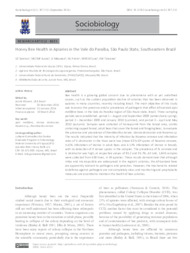Honey Bee Health in Apiaries in the Vale do Paraíba, São Paulo State, Southeastern Brazil.
Honey Bee Health in Apiaries in the Vale do Paraíba, São Paulo State, Southeastern Brazil.
Author(s): SANTOS, L. G.; ALVES, M. L. T. M. F.; MESSAGE, D.; PINTO, F. A.; SILVA, M. V. G. B.; TEIXEIRA, E. W.
Summary: Bee health is a growing global concern due to phenomena with as yet undefined causes, such as the sudden population decline of colonies that has been observed in apiaries in many countries, recently including Brazil. The main objective of this study was to assess the presence and/or prevalence of pathogens that afflict Africanized Apis mellifera bees in the Vale do Paraíba region of São Paulo state, Brazil. Three sampling periods were established: period 1 ? August and September 2009 (winter/early spring); period 2 ? December 2009 and January 2010 (summer); and period 3 ? April and May 2010 (autumn). The results demonstrate that although mites and microsporidia are widespread in the region?s colonies, the Africanized bees are apparently tolerant to pathogens and parasites. However, the mechanisms related to defense against pathogens are not completely clear, and monitoring and prophylactic measures are essential to maintain the health of bee colonies.
Publication year: 2014
Types of publication: Journal article
Unit: Embrapa Dairy Cattle
Keywords: Apis Mellifera, Nosema, Paenibacillus larvae, Varroa destructor
Observation
Some of Embrapa's publications are published as ePub files. To read them, use or download one of the following free software options to your computer or mobile device. Android: Google Play Books; IOS: iBooks; Windows and Linux: Calibre.
Access other publications
Access the Agricultural Research Database (BDPA) to consult Embrapa's full library collection and records.
Visit Embrapa Bookstore to purchase books and other publications sold by Embrapa.

